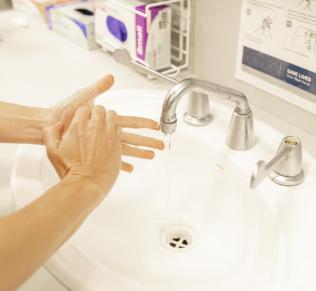- Managing your Practice
-
- Your Benefits
-

Introducing the ultimate Club MD experience
From work to play, and everything in between, we provide you with access to hundreds of deals from recognizable, best-in-class brands, elevating every facet of your life – from practice supports to entertainment, restaurants, electronics, travel, health and wellness, and more. Your Club MD membership ensures that these deals are exclusive to you, eliminating the need to search or negotiate.
Welcome to the ultimate Club MD experience. Your membership, your choices, your journey.
-
- Advocacy & Policy
-
- Collaboration
- News & Events
-

Stay Informed
Stay up to date with important information that impacts the profession and your practice. Doctors of BC provides a range of newsletters that target areas of interest to you.
Subscribe to the President's Letter
Subscribe to Newsletters
-
- About Us
-

“Soap and water and common sense are the best disinfectants” — Sir William Osler
January 28, 2020
President's Blog
Winter is typically a time we associate with cold and flu season. The public is inundated with messages on ways to reduce transmission of viruses including promoting hand washing, getting the flu vaccine, coughing into your elbow, and staying away from work or school if you are sick. To Sir William Osler’s point, a little soap and water and good hygiene does indeed go a long way to manage disease spread.
Yet every season brings the same uptick in office and emergency room visits from patients with respiratory infections. Every year clinicians collectively review best practices to reduce the risk to first contact health care providers and their staff.
 Given there are more than 200 different types of viruses causing the “common cold,” primarily Rhinoviruses, that are best treated conservatively with rest, hydration, and symptom support, the need to identify and track the specific viral cause of these minor illnesses in unnecessary. However, as Canada now has two confirmed cases for 2019- nCoV, an aggressive novel Coronovirus, including a newly diagnosed case in BC, perhaps us physicians making first contact need to re-consider the readiness of individual primary care sites for a wide spread outbreak.
Given there are more than 200 different types of viruses causing the “common cold,” primarily Rhinoviruses, that are best treated conservatively with rest, hydration, and symptom support, the need to identify and track the specific viral cause of these minor illnesses in unnecessary. However, as Canada now has two confirmed cases for 2019- nCoV, an aggressive novel Coronovirus, including a newly diagnosed case in BC, perhaps us physicians making first contact need to re-consider the readiness of individual primary care sites for a wide spread outbreak.
The BC Centre for Disease Control has confirmed that risk of person to person transmission of the Coronavirus is low because the virus is typically spread by droplets of infective materials from the respiratory tract. This places 2019-nCoV is the same transmission category as Influenza, without a vaccine prevention option. The risk is highest in those who are in close personal contact over a period of time, including health care practitioners.
The majority of our prevention and management practices are developed with an eye to hospital management of pandemics, including Influenza, SARS, MERS, and other novel Coronaviruses outbreaks. Dr. Patricia Daly’s 2007 BC Medical Journal article reviewed the many strategies Community Physician offices can adopt to reduce the risk for staff, patients, and primary care providers. Some studies suggest that protocols may not be optimal in busy multi-practitioner offices, compared to hospital settings, during respiratory virus outbreaks and that we could do better.
Guidelines often refer to stockpiling practices such as N95 masks, gowns, eye protection and antiviral medications, but these carry significant infrastructure costs straining community practice resources. As an example, each N95 mask can cost $10 or more, are single use, and unused ones need to be replaced every 3 years. Paper masks, the type flying off the shelves in pharmacies across BC, block large splashes, but generally offer little protection from respiratory viruses, according to the US Food and Drug Administration, as they are loose fitting and leave the eyes exposed.
Primary care offices can implement a few procedures easily, if not already in place. Telephone triage of potentially infected patients is critical, yet takes time. Additional measures including physical barriers, hand hygiene, and other clinic disinfection processes can place further demands on office staff, particularly if staff or physicians fall ill. Additional costs for protective strategies are subsidized by clinicians working in private community practice, an already strained resource. Yet few documents speak to the importance of frontline practices as part of a Pandemic strategy. In fact, the first SARS case in Canada was diagnosed and treated by a Family Physician who was unaware of the SARS risk, wore no protective materials and subsequently died.
We have learned a great deal since SARS, particularly around knowledge dissemination and identifying and reporting cases. As a front line practitioner, I am grateful for the support of our Medical Health Officers and BCCDC Medical Microbiologists across BC who are available 24/7 for guidance on appropriate testing and precautions. The BCCDC, the Public Health Agency of Canada, and BC’s Ministry of Health are issuing regular updates on novel or emerging illnesses in Canada for both practitioners and the public. I have faith that the greater healthcare system will be ready to offer assistance when needed. I will do my best to arm myself with as many defences as possible.
Alongside my front line colleagues, I stand ready to do my part, ready to assess the many undifferentiated flu-like illnesses that present to my office that could harbour a life-threatening illness, and I will do my best not to put my life on the line in the process.
- Dr Kathleen Ross




